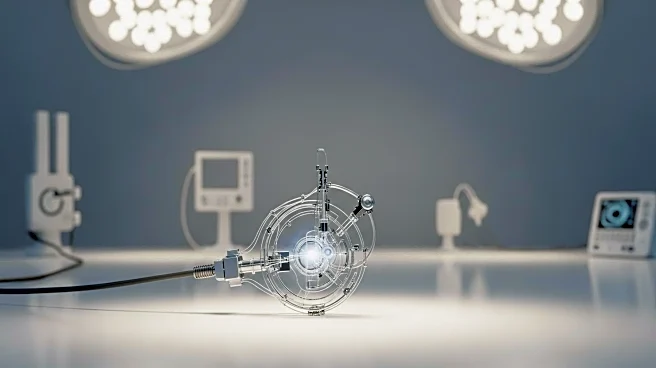What's Happening?
Micro Interventional Devices (MID), a company specializing in Transcatheter Tricuspid Valve Repair (TTVr), has received approval from the U.S. Food & Drug Administration (FDA) for its MIA-T Percutaneous Tricuspid Annuloplasty System. This approval allows
MID to commence the STTAR-US IDE pivotal trial at prominent U.S. hospitals. The MIA-T system utilizes proprietary PolyCor anchors designed for cardiac tissue, aiming to treat functional tricuspid valve disease by reducing annular area and minimizing Tricuspid Regurgitation (TR). The trial is led by cardiologists Bassem Chehab, MD, and Saibal Kar, MD, and addresses the significant unmet clinical needs of 1.6 million TR patients in the U.S., many of whom are ineligible for surgical treatment.
Why It's Important?
The FDA approval of MID's MIA-T system is a significant development in the treatment of tricuspid valve disease, offering a minimally invasive option for patients who cannot undergo surgery. This advancement is crucial as it addresses a large, untreated patient population, potentially improving patient outcomes and expanding the TTVr market. The global market for tricuspid valve repair is projected to exceed $3 billion annually by 2027, indicating substantial growth opportunities for MID and other stakeholders in the medical device industry. The approval also highlights the increasing demand for innovative solutions in structural heart disease treatment.
What's Next?
With the FDA approval, MID will initiate the STTAR-US pivotal trial, which is expected to provide valuable data on the efficacy and safety of the MIA-T system. The trial's outcomes could influence future regulatory decisions and market adoption of the technology. As the trial progresses, MID may seek further approvals and partnerships to expand its reach and impact in the TTVr market. Stakeholders, including healthcare providers and patients, will be closely monitoring the trial's results, which could lead to broader acceptance and integration of minimally invasive tricuspid valve repair solutions.
Beyond the Headlines
The development of the MIA-T system represents a shift towards less invasive cardiac procedures, potentially reducing healthcare costs and improving recovery times for patients. This innovation may also prompt ethical discussions regarding access to advanced medical technologies and the prioritization of research funding for conditions with high unmet needs. As the technology evolves, it could pave the way for further advancements in percutaneous solutions for other structural heart diseases.

















